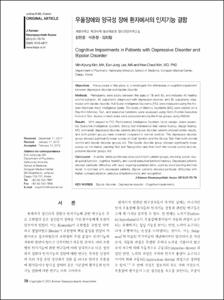우울장애와 양극성 장애 환자에서의 인지기능 결함
- Keimyung Author(s)
- Kim, Hee Cheol
- Department
- Dept. of Psychiatry (정신건강의학)
- Journal Title
- 신경정신의학
- Issued Date
- 2012
- Volume
- 51
- Issue
- 2
- Abstract
- The purpose of this
study is to investigate the differences of cognitive impairment between depressive disorder and bipolar disorder.
Methods
Participants were adults between the ages of 18 and 65, and included 40 healthy control subjects, 40 outpatients diagnosed with depressive disorder, and 35 outpatients diagnosed with bipolar disorder. Full-Scale Intelligence Quotients (FIQ) were measured using the Korean-Wechsler Adult Intelligence Scale. The levels of Memory Quotients (MQ) were yielded on a Rey-Kim Memory Test, and executive functions were assessed using Kim's Frontal-Executive Function Test. Scores of each scale were compared among the three groups using ANOVA.
Results
With respect to FIQ, Performance Intelligence Quotient, block design, object assembly, Executive Intelligence Quotient, Stroop test-interference trial, verbal fluency, design fluency, MQ, and recall, depressive disorder patients and bipolar disorder patients showed similar results, and both patient groups were impaired compared to normal controls. The depressive disorder group showed significantly lower scores on Digit Symbol and the Stroop Test than both normal control and bipolar disorder groups did. The bipolar disorder group showed significantly lower scores on the Verbal Learning Test and Recognition task than both the normal control and depressive disorder groups did.
Conclusion
A similar deficit profile was observed in both patient groups, involving poorer visual-spatial function, cognitive flexibility, and overall executive function/memory. Depressed patients showed particular difficulties with tasks requiring sustained effort, such as word learning and free recall. In contrast with depressed patients, Bipolar patients showed particular difficulties with higher conceptualization, selective attention/control, and recognition.
Keywords: Bipolar disorder; Depressive disorder; Cognitive Impairments
- Alternative Title
- Cognitive Impairments in Patients with Depressive Disorder and Bipolar Disorder
- Keimyung Author(s)(Kor)
- 김희철
- Publisher
- School of Medicine
- Citation
- 김민경 et al. (2012). 우울장애와 양극성 장애 환자에서의 인지기능 결함. 신경정신의학, 51(2), 70–76.
- Type
- Article
- ISSN
- 1015-4817
- Appears in Collections:
- 1. School of Medicine (의과대학) > Dept. of Psychiatry (정신건강의학)
- 파일 목록
-
-
Download
 oak-bbb-4733.pdf
기타 데이터 / 967.63 kB / Adobe PDF
oak-bbb-4733.pdf
기타 데이터 / 967.63 kB / Adobe PDF
-
Items in Repository are protected by copyright, with all rights reserved, unless otherwise indicated.